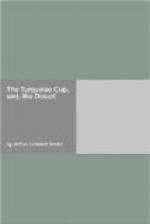For centuries it has been the custom of Sahara caravans to travel not more than five miles the first day. Abdullah, the iconoclast, made thirty-three. Ali came to him at two o’clock.
“Shall we camp, master?” he asked.
“When I give the word,” replied Abdullah. “You forget that the wells at Okba are choked. We shall camp at El Zarb.”
“El Zarb,” exclaimed Ali. “We should camp there to-morrow.”
“Must I continually remind you,” said Abdullah, “that to-morrow may never dawn? We camp at El Zarb to-night.”
At nine o’clock they marched under the palms of El Zarb. Abdullah held up his hands; Ali ran to the head of the dun leader; the caravan halted, groaned, and knelt. The first day’s journey was over.
III
The moment that the halt was accomplished, Abdullah went about, loosing the surcingles of his camels. Then he began to pitch his tent. It was of camel-skins, stretched over eight sticks, and fastened at the edges with spikes of locust wood. It was entirely open at the front, and when he had the flaps pinned, he gathered a little pile of camels’ dung, struck a match, and began to make his tea. He had no thought for his passengers. His thoughts were with his heart, and that was back at the house beyond the bazaar—the house with the green lattices. Before the water boiled, Ali came up, eager, breathless.
“Master,” he said, “the passengers are cared for, and the mistress wears a flower like—like that; the one you showed me;” and he pointed to Abdullah’s bosom. “You are either a faithful servant,” said Abdullah, “or you are a great liar. The morrow will tell.” And he started toward the passengers’ tent. He found it closed. Being a woman’s tent, it had front flaps, and they were laced. He walked back and forth before it. He was master of the caravan, more autocratic than the master of a ship. He might have cut the laces, entered, and no one could have questioned. That is the law of the desert. He could more easily have cut his own throat than that slender cord.
He wandered back and forth before the tent. The twilight faded. The shadows turned from saffron to violet, to purple, to cobalt. Out of the secret cavern of the winds came the cool night-breeze of the Sahara.
Still he paced up and down, before the little tent. And as he measured the sands, he measured his life. Born of a camel-driver by a slave; working his way across the desert a score of times before his wages made enough to buy one bale of hides; venturing the earnings of a lifetime on one voyage—making a profit, when a loss would have put him back to the beginning—venturing again, winning again—buying three camels—leasing them—buying three more—starting an express from the Soudan to Biskra one day short of all others;—carrying only dates and gold-dust—insuring his gold-dust, something he learned from the French in Biskra;—buying thirty camels at a plunge—at once the master camel-driver of the Sahara—and here he was, pacing up and down before a laced tent which held behind it—a woman.




